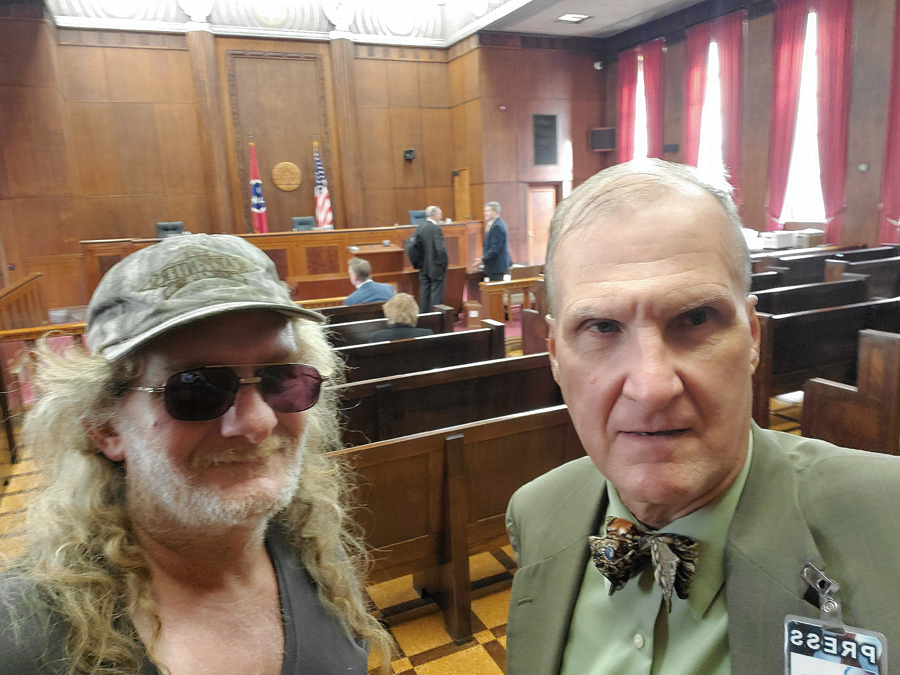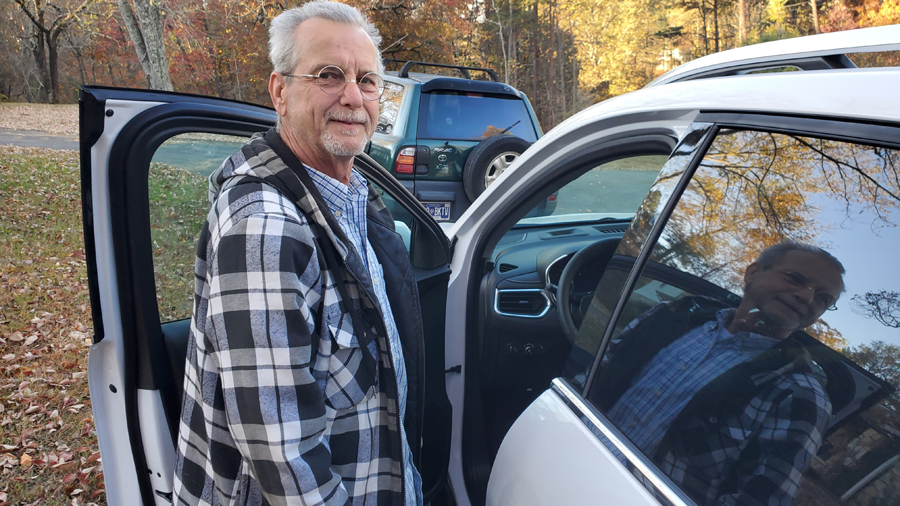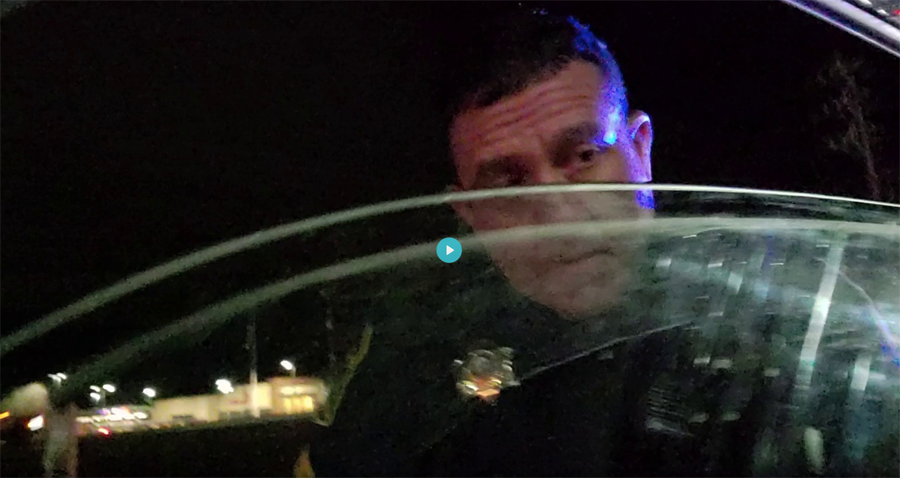
Feral Harlan County, Ky., native from Alcoa, Tenn., his T-shirt sagged by phone, smokes and lighter, whiskery jowls enshadowed by a special ballcap to account for brain size and a straggle of hair at his neck. He joins me to hear my case against New York loan shark Flexibility Capital on Nov. 14, 2023, in the supreme court building in Knoxville.
CHATTANOOGA, Tenn., Saturday, Dec. 2, 2023 — My petition for a temporary injunction in my reform suit against the department of revenue contends that I am likely to prevail in the case because the law is clear.
By David Tulis/ NoogaRadio Network
I meet deadline Friday, filing the document with Karyn Hill, assistant to administrative hearing officer Brad Buchanan at 9:50 p.m., and a copy sent to Camille Cline, department attorney for commissioner David Gerregano.
A great blessing Friday as I work into the night at the radio station studio is Ed Soloe of Alcoa, who is attentive to the live Google doc we share. He catches important omissions. He double checks cites. He proposes wording. In an appendix citing court cases such, he proposes additional ones, leaving them in magenta color for review. He reads the 7,800-word motion plus appendices as if they are his own. One of them he assembled — a document with cites to T.C.A. §55-12-101 et seq showing that the law operates in terms of accidents, and in terms of financial responsibility.
We are not, in other words, a mandatory insurance state where law and practice combine to make insurance a precondition for use of the road as driver, operator or owner.
Mr. Soloe knows cases. He has been studying law for the past five years, and speaks with a Harlan County, Ky., drawl from growing up there in poverty. He is a handyman, unemployed, fixing cars of poor neighbors, screwing in toilet seats, massaging software glitches at an Indian-run hotel on 11A highway between Knoxville and Jefferson City. He knows the Tennessee financial responsibility law of 1977, with its 42 sections in Part 1, and its 15-section Part 2, inside and out.

A strong supporter of my work, Mark the Trucker, is now retired from trucking, and hopes to move from Florida to Tennessee. Here, he says farewell after a visit to my house in Soddy-Daisy. In background, the green RAV4 I use in traveling the public road, and from which I am arrested Nov. 22 exercising the right of communication and movement as a press member. (Photo David Tulis)
He is a victim of abusive prosecution of this law, his minivan having been towed from the middle of a highway, to the side of which he and his wife, Allison, and their daughter were left by police and tow truck operator. Mr. Soloe recently pleaded guilty in a criminal case for which he’d been prepared to go to trial — a “driving on suspended” case. Poverty’s claims upon him drove him to yield to a DA’s bully offer.
‘Likelihood of success’
The motion asks Mr. Buchanan, sitting for the Tennessee’s tax kommissar, to rescind the automated revocation of the registration of my Honda Odyssey minivan, with its state tag on the back. It is now expired.
I face imminent arrest using this car on the road, which is an imminent threat. Injunctions require the showing of four proofs. These are the prospect of future irreparable harm, whether the injunction inequitably hurts the other side, whether it affects the public interest, and the likelihood of success.
In the 5-page section on pending irreparable harm, I make the case for private travel and ask Mr. Buchanan to take administrative (or judicial) notice of the state of affairs in Tennessee regarding how cops and deputies enforce commercial government upon the travel in public. I ask for a valid tag because cops promiscuously enforce the commercial law, and abuse all private travelers as a group. I have a right of commerce on the road (as registered car user, and licensee as driver, operator). I also have right as private user which is lawlessly ignored by all, I claim.
I locate my protectible activities under the constitution in this private sector. That would be press rights, assembly, religion, occupation. I say I have not used the van as a motor vehicle in commerce, but have a right to elect to do so at any time.
I debate whether to bring into this section of my filing this clear proof of my claim about commercial government. My arrest for traveling in my car Nov. 22, 2023, is a perfect example of the operation of the state’s general warrants and bill of attainder scheme.

Brandon Bennett, sheriff’s deputy, says “driving is privilege” and his job is to protect constitutional liberties. He also says I am not moving in commerce on the day of my arrest, Nov. 22, 2023. Our court proceedings will hold him to account on these claims. (Photo David Tulis)
Brandon Bennett, sheriff’s deputy, sees a bit of missing red plastic in the right rear taillight of my 1999 Toyota RAV4, a small utility truck, damaged in a tire blowout Nov. 14 on my trip to Knoxville to argue my Flexibility Capital loan shark case. He says he’s certain I’m not in commerce, but arrests me refusing to identify myself by my license, which would be an admission of commercial activity. I am seized, put into the cruiser cage, and dragged at Silverdale detention center from the car to the steel door of the booking desk, scuffing the tops of my black dress shoes along the pavement.
I decide, consulting with Mr. Soloe, to not mention this case, as it does not pertain directly to the tag dispute, Though it is evidence of the general warrants and attainder mechanism.
In prosecuting this case to stop abuse of the public I developed the thesis put forth by mining law expert Hal Anthony of the Jefferson Mining District in Oregon and webcaster at Behind the Woodshed on Reallibertymedia.com every Sunday 3 p.m. Eastern time. Mr. Anthony says we must ground a defense of travel upon the land.
Yes, that’s right. The land itself. The soil and our relationship to it by dint of living in houses and apartment blocks on land.
The right of ingress and egress is of serious interest to miners of all kind. Mr. Anthony does serious research into these issues, joined by the noted Ron Gibson, who has published two books on property taxation.
I keep my “Administrative notice; Affidavit of right of ingress, egress from abode, land in Tennessee” on reserve for now, figuring to enter it with my main brief presenting my case in chief.
State’s contempt for people, rights
Tennesseans and all who pass through the state are under a bill of pains and penalties, or a bill of attainder — as if such a bill had been passed by the General Assembly and authorizes all people to be arrested for exercising the right of travel. But no such bill has been voted on and passed, because such is unconstitutional and illegal. However, we live in Tennessee under a tyrannical regime of attainders and general warrants little noticed by reps and senators, and grinding against the people in each of the 95 counties statewide, with rural areas the most lawless, according to report.
Motion temporary injunction – Tulis v. DOR
It works like this. An entire class of people in Tennessee are banned and outlawed by dint of practice among police, deputies and troopers. These people are those who travel freely on the public right-of-way and use the freeway as if they were in fact free. By law no one can obstruct a highway or roadway or force anyone to pay a private toll or fee. The war against this group of people rejects this concept. It says if you are not a merchant operator of a motor vehicle, you are guilty of “driving on suspended” or “driving without a tag” or “driving an unregistered car” or “driving on revoked registration” or “failure to exhibit (license) on demand,” or other such “traffic” charge.”
These citations allow a compromise with the public, the end of mass arrests. But, still, citations bring people into criminal court. The Gnome of Strawberry Plains, John Ballinger, says, “The charge is the conviction.”
The system of commercial government holds sway by letting two contradictions control. One is that all travel is commercial — even Gran’ma has to have a “license do drive.” But to not upset the public, it declines to require her to fulfill all the duties of truckdrivers, including the F$50 annual carrier fee and compliance with the national trucking registry. So, the state admits private travel in practice, though insisting on the outward form of privilege for all, even private users with no business or commerce whatsoever.
The rule in Tennessee is like unto every other state. Legal trickery and legal fiction artfully keep the system of fraud alive — in the insurance scam I am challenging, and also the general operation of police regulation of all travel into the funnel of commerce.
I bring into my petition the notorious State versus Booher case in which the Court of Appeals has what is the most amazing judicial trick that I’ve encountered. State v. Booher, 978 S.W.2d 953, 955–56 (Tenn. Crim. App. 1997). It can be boiled down to this single sentence in a set of 2 paragraphs in which the judges appear to recognize the important distinction between travel and transportation. “Travel, in the constitutional sense, however, means more than locomotion; it means migration with the intent to settle and abide.” This sentence is ambiguous — intentionally so — and misleads every judge and DA in the state as saying, “the only travel in Tennessee recognized by law is change of domicile.” ‡
No doubt Mrs. Cline will pick upon my use of this case — but I plan to be ready to answer her. I have an absolute and free right of movement, and change of domicile is just one such liberty of self-propulsion and locomotion.
My success in defending the right of movement depends on the distinctions made by the Tennessee privilege cases, of which there are about 15 summarize and listed in the Trentham case. Trentham v. Moore, 3 Cates 346 Supreme Court of Tennessee, 1903. ‡‡
State government and its privies and agents in cities and counties have a single way to legally tax and regulate any private person, and that is through privilege.
My pleadings highlight the nature of privileges, citing Phillips v. Lewis regarding bitches and asses — whether people might own such creatures without having to submit to privilege or licensing requirements. Answer: Yes, if the animals are not used in commerce. A privilege has to always have at the heart a commercial or for-profit economic interest or purpose.
In our fraudulent regime, Gran’ma is taxed and must be in privilege even though she has never had the first thought of being a “for hire” carrier shifting goods or passengers from one part of town to the other.
My motion says I have a right of travel and ingress/egress — and also the right of commerce, from early days of the republic. I’m asserting both rights and request the injunction to protect my right of travel which will certainly be interfered with by police and deputies who are running the scam upon the privilege of commerce. I indicate that if these people were not always patrolling the roads, I could simply take the plate off and travel freely. But because they are operating a bill of attainder, effectively following the Gerregano and Jeff long program at the department of safety, I face imminent irreparable harm of false imprisonment and false arrest.
Footnotes
‡ If travel means more than locomotion, it also means and includes locomotion or self-propelled movement down the public road. Judicial trickery at its best, the creation in 1977 of a profound legal fiction controlling sessions, circuit and criminal courts statewide:
We agree with the appellant that he enjoys a fundamental right to freedom of travel. *** Travel, in the constitutional sense, however, means more than locomotion; it means migration with the intent to settle and abide. Id. Thus, any American is free to travel from state to state, and to change his state of residence or employment whenever he desires, unrestricted by unreasonable government interference or regulation. See 16A C.J.S. Constitutional Law § 478 (1969). Whether a specific type of travel is protected by one’s constitutional right to travel depends upon the intent which motivates the movement. Id.
2 In the present case, the appellant asserts that the State of Tennessee has unduly infringed upon his “right to travel” by requiring licensing and registration of his motor vehicles prior to operation on the public roadways of this state. However, contrary to his assertions, at no time did the State of Tennessee place constraints upon the appellant’s exercise of this right. His right to travel within this state or to points beyond its boundaries remains unimpeded. Thus, not only has the appellant’s right to freedom of travel not been infringed, but also, we cannot conclude that this right is even implicated in this case. Rather, based upon the context of his argument, the appellant asserts an infringement upon his right to operate a motor vehicle on the public highways of this state. This notion is wholly separate from the right to travel.
*956 3 The ability to drive a motor vehicle on a public highway is not a fundamental “right.” *** (citations omitted). Instead, it is a revocable “privilege” that is granted upon compliance with statutory licensing procedures.
State v. Booher, 978 S.W.2d 953, 955–56 (Tenn. Crim. App. 1997) (emphasis added)
‡‡ Quoting from Trentham v. Moore, and put into a handy list. The key case is in the second list, that being Phillips v. Lewis. The state controls private people SOLELY through privilege.
We have numerous cases upon the subject.
Mabry v. Tarver, 1 Humph. 94, 98;
Cate v. State, 3 Sneed, 121;
French v. Baker, 4 Sneed, 195;
Robertson v. Heneger, 5 Sneed, 257;
Mayor v. Guest, 3 Head, 414;
State v. Schlier, 3 Heisk. 283;
Jenkins v. Ewin, 8 Heisk. 475;
Wiltse v. State, 8 Heisk. 544, 547;
Clarke v. Montague, 3 Lea, 274-277;
Dun v. Cullen, 13 Lea, 202, 204;
Phillips v. Lewis, 3 Tenn. Cas. 230;
Pullman v. Gaines, 3 Tenn. Ch. 591;
Kurth v. State, 86 Tenn. 134, 136, 5 S. W. 593;
Turnpike Cases, 92 Tenn. 369, 372, 22 S. W. 75;
- R. v. Harris, 99 Tenn. 702, 703, 43 S. W. 115, 53 L. R. A. 921.
There is an apparent conflict between some of the earlier cases and the later ones, but the result of the later cases is that a privilege is whatever business, pursuit, or avocation, affecting the public, the Legislature may choose to declare to be a privilege, and to tax as such. Turnpike Cases, 92 Tenn. 369, 372, 22 S. W. 75;
Phillips v. Lewis, 3 Tenn. Cas. 230;
Clarke v. Montague, 3 Lea, 274-277;
Dun v. Cullen, 13 Lea, 202, 204;
Kurth v. State, 86 Tenn. 134, 136, 5 S. W. 593;
R. R. v. Harris, 99 Tenn. 702, 703, 43 S. W. 115, 53 L. R. A. 921. This is held to be a sound construction of the word “privileges,” appearing in that portion of article 2, § 28, of the Constitution of this state, which provides that “the Legislature shall have power to tax merchants, peddlers, and privileges in such manner as they may from time to time direct.” 92 Tenn. 372, 22 S. W. 75.

